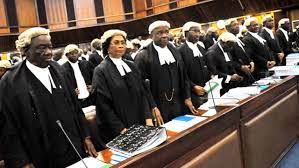
Some lawyers in Lagos on Sunday advised the judiciary against rulings and judgments that could promote religious bigotry.
The lawyers said that the judiciary remained the hope of the common man and should express so in all its decisions.
They advised the third arm of government, particularly the Supreme Court, to ensure that its rulings and judgments would promote religious harmony since such decisions would be final.
Mr Spurgeon Ataene, also a social critic, said that court decisions must reflect Nigeria’s status as a secular state.
According to him, the apex court should correct any wrong judgments by overruling itself in the interest of Nigeria.
Ataene, the Head of Civil Litigation Department of L’avocat Legal Practitioners, said that although the country’s constitution provided for freedom of worship, no right was absolute.
According to him, a right must be subject to the interest of those it seeks to let loose.
He said that every religion would, therefore, operate within the space allowed by law.
Mr Chris Ayiyi, the Principal Partner of Ayiyi Chambers, also advised the judiciary against controversial rulings and judgments to avoid heating up the polity.
A former Chairman of Nigerian Bar Association, Ikorodu Branch, Mr Bayo Akinlade, told NAN that any wrong court decision could have a ripple effect on the society.
According to him, any court decision that seems to protect only a particular religion can encourage others to seek to be recognised anyhow.
“It is a slippery slope in the sense that we may have a lot of other religions and cultures coming out to establish their own rights and self-determination,” Akinlade said.
Mr Marculay Ugwummadu, a former National President of the Committee for the Defence of Human Rights, said that the rulings and judgments seeming to protect a particular religious would be blown on the circularity of Nigeria.
He appealed to the courts, especially the Supreme Court, to be more careful while handling issues bordering on religion since its decisions would be final.
“The Supreme Court is final, not because it is infallible; it is infallible because it is final,” he said.
The human rights lawyer said that such decisions would have implications on the fundamental rights of citizens.
“The language of the constitution is that the federation of Nigeria shall not adopt any religion as the state religion.
“Religion is a private and not a public issue,” Ugwummadu said.
Also, Mr Ige Asemudara, a Lagos-based lawyer, urged that Supreme Court decision should not over-stretch the limit of rights to religion.
The lawyer added that courts, in their decisions on issues relating to religion, should be sensitive to the religious rights of others.
He appealed to the Supreme Court to review any of its decisions posing a threat to the unity of the country.

